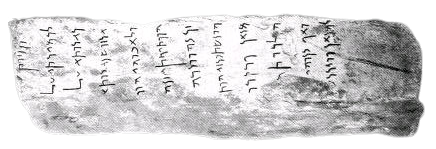The book of Genesis was originally written in Hebrew as was the most part of the Old Testament.Only the book of Ezra and Daniel were originally written in Aramaic.
The Syriac Aramaic translation of Genesis 1:1 from the Peshitta Tanakh.
ܒܪܵܫܝܼܬܼ ܒܪ݂ܵܐ ܐܲܠܵܗܵܐ ܝܵܬܼ ܫܡܲܝܵܐ ܘܝܵܬܼ ܐܲܪܥܵܐ
The Targum Onkelos is the Jewish Aramaic translation of the Torah,the five books of Moses ,the first five books of the Hebrew Bible ,the Pentateuch (from Greek). Targum means translation and Onkelos was the author,a Roman national who converted to Judaism.
The Syriac Aramaic translation of Genesis 1:1 from the Peshitta Tanakh.
ܒܪܵܫܝܼܬܼ ܒܪ݂ܵܐ ܐܲܠܵܗܵܐ ܝܵܬܼ ܫܡܲܝܵܐ ܘܝܵܬܼ ܐܲܪܥܵܐ
brashyutu briaʾ ʾalahaʾ yatu shmayaʾ wyatu ʾarʿaʾ
Jewish Palestinian Aramaic
מן ריש הווית מימרה ומימרה הוות לות אלהה ואלהה הו מימרה׃ הדין הווה מן ריש לות אלהה׃ כולה בה אתעבד ולבר מנה כולם אתעבד מה דאתעבד׃
mn ryš hwwyt mymrh wmymrh hwwt lwt ʾlhh wʾlhh hw mymrh hdyn hwwh mn ryš lwt ʾlhh kwlh bh ʾtʿbd wlbr mnh kwlm ʾtʿbd mh dʾtʿbd
Genesis 1:1–6 in Aramaic
(a part of Genesis 1:7 also got room: ”and God made the vault”: ܘܰܥ̣ܒ݂ܰܕ݂ ܐܰܠܳܗܳܐ ܪܩܺܝܼܥܳܐ)
Genesis 1:1-6 in English:
In the beginning God created the heavens and the earth. And the earth was formless and empty (chaos), and darkness was over the surface of the deep, and the Spirit of God was hovering over the waters.
And God said, “Let there be light,” and there was light. And God saw that the light was good, and God separated the light from the darkness. God called the light “day,” and the darkness he called “night.” And there was evening, and there was morning – the first day.
And God said, “Let there be a vault between the waters to separate water from water.”
Aramaic: ܒܪܺܝܼܫܺܝܼܬ݂ ܒ̣ܪܳܐ ܐܰܠܳܗܳܐ ܝ̇ܳܬ݂ ܫܡܰܝ̈ܳܐ ܘܝ̇ܳܬ݂ ܐܰܪܥܳܐ. ܘܰܐܪܥܳܐ ܗܘܳܬ݂݀ ܬܽܘܿܗ ܘܒܽܘܿܗ. ܘܚܶܫܽܘܼܟ݂ܳܐ ܥܰܠ ܐܰܦ݂ܰܝ̈ ܬܽܗܘܼܡܳܐ. ܘܪܽܘܼܚܶܗ ܕܰܐܠܳܗܳܐ ܡܪܰܚܦܳܐ ܥܰܠ ܐܰܦ݂ܰܝ̈ ܡܰܝ̈ܳܐ. ܘܶܐܡ̣ܰܪ ܐܰܠܳܗܳܐ: ܢܶܗ̣ܘܶܐ ܢܽܘ̣ܗܪܳܐ: ܘܰܗ̣ܘܳܐ ܢܽܘ̣ܗܪܳܐ. ܘܰܚ̣ܙܳܐ ܐܰܠܳܗܳܐ ܠܢܽܘ̣ܗܪܳܐ ܕ݂ܫܰܦ݂ܺܝܼܪ: ܘܰܦ̣ܪܰܫ ܐܰܠܳܗܳܐ ܒܹܶܝܬ݂ ܢܽܘܼܗܪܳܐ ܠܚܶܫܽܘܼܟ݂ܳܐ. ܘܰܩ̣ܪܳܐ ܐܰܠܳܗܳܐ ܠܢܽܘܼܗܪܳܐ ܐܺܝܼܡܳܡܳܐ: ܘܰܠܚܶܫܽܘܼܟ݂ܳܐ ܩ̣ܪܳܐ ܠܺܠܝܳܐ: ܘܰܗ̣ܘܳܐ ܪܰܡܫܳܐ ܘܰܗ̣ܘܳܐ ܨ̇ܰܦ݂ܪܳܐ ܝܰܘܡܳܐ ܚܰܕ݂. ܘܶܐܡ̣ܰܪ ܐܰܠܳܗܳܐ ܢܶܗ̣ܘܶܐ ܪܩܺܝܼܥܳܐ ܒ݂ܡܶܨܥܰܬ݂ ܡܰܝ̈ܳܐ: ܘܢܶܗ̣ܘܶܐ ܦ݂̇ܳܪܶܫ ܒܹܶܝܬ݂ ܡܰܝ̈ܳܐ ܠܡܰܝ̈ܳܐ.
Transliteration (Western pronunciation):
b-rišiṯ bro Aloho yoṯ šmayo w yoṯ arʿo. w arʿo hwoṯ tuh w vuh. w ḥešuḵo ʿal afay thumo. w ruḥe d-Aloho mraḥpo ʿal afay mayo. w emar Aloho: nehwe nuhro: wa hwo nuhro. wa ḥzo Aloho l-nuhro ḏ-šafir: wa fraš Aloho beṯ nuhro l-ḥešuḵo. wa qro Aloho l-nuhro imomo: wa l-ḥešuḵo qro lilyo: wa hwo ramšo wa hwo ṣafro yawmo ḥaḏ. w emar Aloho nehwe rqiʿo v-meṣʿaṯ mayo: w nehwe foreš beṯ mayo l-mayo.
Transliteration (academical & Eastern pronunciation):
brāšīṯ brā Allāhā yāṯ šmayyā w yāṯ arʿā. w arʿā hwāṯ tōh w ḇōh. w ḥeššōḵā ʿal ap̄ay thūmā. w rūḥeh d-Allāhā mraḥpā ʿal ap̄ay mayyā. w emar Allāhā: nehwē nūhrā: wa hwā nūhrā. wa ḥzā Allāhā l-nūhrā d-šap̄īr: wa p̄raš Allāhā bēṯ nūhrā l-ḥeššōḵā. wa qrā Allāhā l-nūhrā īmāmā: wa l-ḥeššōḵā qrā lelyā: wa hwā ramšā wa hwā ṣap̄rā yāwmā ḥaḏ. w emar Allāhā nehwē rqīʿā b-meṣʿaṯ mayyā: w nehwē pāreš bēṯ mayyā l-mayyā.

